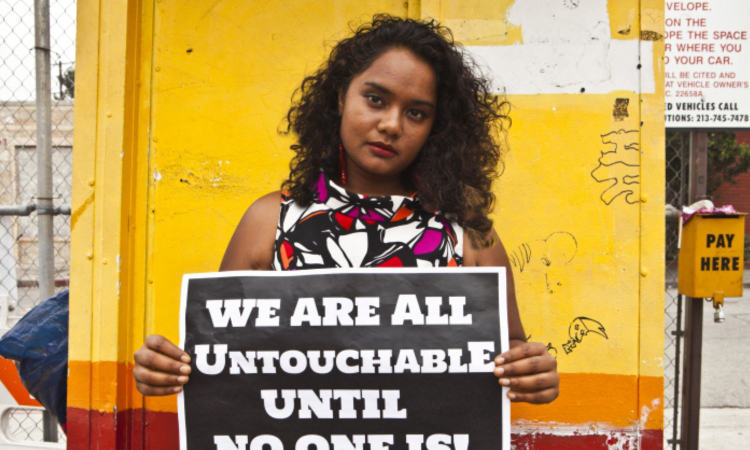Editorial: Hear the new voice against Varna
But increasingly in recent years, a new generation of Dalit scholars, artistes, and activists has wrested the mike and now speak for themselves, in a language and manner of their choice. This is welcome because it enables a truer and more nuanced negotiation of what our mainstream must look like.

Activists Thenmozhi Soundararajan
CHENNAI: The part of India that calls itself the Mainstream has always contrived to gatekeep the discourse on caste such that it remained Fabian, social democratic, or progressivist with permissible ingredients. In the decades following the death of Dr Ambedkar, Mainstreamers managed to appoint themselves as spokespersons for Dalit causes because they had the ‘right’ degrees, language, accent and social capital.
But increasingly in recent years, a new generation of Dalit scholars, artistes, and activists has wrested the mike and now speak for themselves, in a language and manner of their choice. This is welcome because it enables a truer and more nuanced negotiation of what our mainstream must look like.
Notably, several of these Dalit articulators have done their work abroad, particularly in the US.
Activists like Thenmozhi Soundararajan have successfully mapped caste prejudice within the global matrix of discrimination systems, thus exposing its unmistakable analogies to slavery, forced indenture, racism, apartheid, conquest and colonialism.
It is due to their work that caste bias among Indian Americans has become the subject of civil rights advocacy in the US. In 2023, Seattle became the first American city to explicitly ban caste discrimination and California became the first state to pass a law equating it to racial discrimination.
Predictably, in India, the response to these new anti-caste articulators continues to be guarded, qualified, and awkward. This betrays the discomfort Savarna scholars have when forced to engage in a frank and equal dialogue by those they claim to speak for. To start with, they dislike being called ‘Savarna’ because naming rights have been taken from them. However, it’s a discomfort they must get used to and overcome, because it is both inevitable and necessary.
Given this context, it does the Tamil Nadu government great credit for giving the Vaikom Award for Social Justice for 2025 to the US-based Dalit civil rights activist Thenmozhi Soundararajan.
The award is given in honour of the late Periyar EV Ramasamy, commemorating his contribution to the Vaikom Satyagraha in the old princely state of Travancore in 1924-25. In the centenary year of that milestone event, it is fitting that we now recognise Soundararajan’s work in identifying new dimensions of caste discrimination and making new generations aware of it. This will go a long way to promote the work of Dalit intellectuals within India, especially their dialogue with Savarna peers.
Soundararajan, whose parents hail from Madurai, is the founder of Equality Labs, a civil rights organisation in the US that has done signature work in positing caste discrimination as hidden apartheid comparable to racism and slavery. The continued prevalence of Dalitwadas in Indian villages is evidence of this form of apartheid, which the Savarna articulation of Dalit causes tends to ignore or pussyfoot around.
In Equality Labs’ 2018 report ‘Caste in the United States’, Soundararajan and her colleagues documented that 1 in 3 Dalit respondents in US workplaces reported discrimination. It laid bare the persistence of caste in supposedly modern milieus, including the virtue-signalling tech industry. While the Vaikom Satyagraha campaigned to end the denial of access for Dalits to public spaces around temples in Kottayam, Soundararajan’s work has shown us how caste prejudice is insidiously transmitted by algorithms and practised through the code of corporate culture.
At a time when Sanatanism is growing in India, justifying caste as divinely ordained social differentiation, it is important to bring young voices like Soundararajan into the spotlight and let them speak for themselves.



